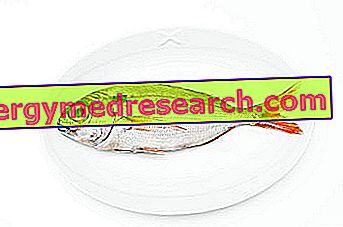Generality
The fatty acids belonging to the omega 6 and omega 3 series are defined as semi-essential, deriving respectively from the biosynthetic pathway of linoleic acid (LA) and alpha linolenic acid (ALA).

Essential and semi-essential fats
Linoleic acid and alpha-linolenic acid are essential fatty acids because the human body is not able to synthesize them independently.
As we have said, the relative semi-essential fatty acids belonging to the omega six and omega three series are obtained from the respective biosynthetic pathways.
The adjective "semi-essential" has been attributed because the introduction of these fatty acids, which can be synthesized by the body, with food is able to bypass the metabolic insufficiencies that we will discuss in the next section. This is why fish and fish oil, rich in semi-essential omega 3 fatty acids, are considered a better source than oil and flaxseed, richer than their precursor, or acid alpha linolenic acid essential fat.
It must also be said that the metabolic importance of semi-essential fatty acids is greater than that of their precursors. In their turn, they are in fact themselves precursors of substances essential for the health of the organism (for further information see the article on essential fatty acids and that on eicosanoids).
Semi-essential fatty acids omega 6
The semi-essential fatty acids of the omega six series are:
- Gamma linolenic acid (GLA)
- Domo-gamma-linolenic acid (DGLA)
- Arachidonic acid (AA).
Semi-essential fatty acids omega 3
The most important semi-essential fatty acids of the omega three series are:
- Eicosapentaenoic acid (EPA)
- Docosahexaenoic acid (DHA).
Essential Fatty Acids (EFA) and semi-essential acids in foods
| Omega series 6 | Food |
| Cis linoleic acid (LA) * | Olive and seed oil |
| Gamma-linolenic acid (GLA) | Blackcurrant oil, borage oil |
| Domo-gamma-linolenic acid (DGLA) | Human milk |
| Arachidonic acid (AA) | Dairy products, meat, human milk, shellfish |
| Omega 3 Series | Food |
| Alpha-linolenic acid (ALA or LNA) * | Linseed, hemp, soy and canola oil |
| Eicosapentenoic acid (EPA) | Fish oil, herring, salmon, whale |
| Docosahexaenoic acid (DHA) | Fish oil, some algae |
| (*) The fatty acids marked with an asterisk are essential, the others are semi-essential | |
Limiting Factors
There are factors that limit the production of semi-essential fatty acids starting from the relative precursors. The main ones are:
- Enzymatic insufficiency
- Incorrect contribution of LA and ALA.
Enzymatic insufficiency
Enzymatic insufficiency limits the production of semi-essential fatty acids.
The biological catalysts involved are mainly of two types:
- Members of the coal chain lengthening.
- Assigned to the coupling of double bonds (see figure).

Particular interest has been turned towards the category of desaturase enzymes.
It has been seen that the activity of the ima-6-desaturase enzyme is of fundamental importance in the metabolism of essential fatty acids.
A-6-desaturase deficiency exerts a negative effect due to the synthesis of the semi-essential fatty acids which, consequently, must necessarily be introduced with food.
The concentration of enzyme ∆-6-desaturase can be reduced in many conditions:
- Diet rich in saturated fatty acids, trans fatty acids or cholesterol
- Fasting
- Stress
- Drug therapy with glucocorticoids
- Drastic or hypoproteic diets
- malabsorption
- Diabetes mellitus
- Viral infections
- Ionizing radiations
- tumors
- Senescence
- Early aging
- Deficiency or malabsorption of fat-soluble vitamins.
Excess of Omega 6
It must be specified that, being the common enzyme system for the omega 3 and omega 6 pathways, an excessive nutritional introduction of linoleic acid (founder of the omega 6) can excessively bind the Δ-6-desaturase enzymes, "slowing down" the metabolism of alpha linolenic acid (progenitor of the omega 3).
This consequence, emphasized by the scarcity of omega-3 foods in the western diet, negatively affects the health of the entire organism.



